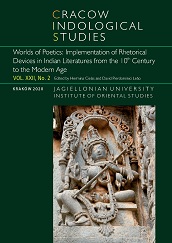Indian Vernacular History-writing and Its Ideological Engagement: A Contemporary Account on Shivaji’s Visit to Agra (1666) in Brajbhāṣā Verse
Indian Vernacular History-writing and Its Ideological Engagement: A Contemporary Account on Shivaji’s Visit to Agra (1666) in Brajbhāṣā Verse
Author(s): Piotr BorekSubject(s): Studies of Literature, 17th Century, Theory of Literature
Published by: KSIĘGARNIA AKADEMICKA Sp. z o.o.
Keywords: Śivājī; Shivaji; Bhūṣaṇ; Bhushan; Śivrājbhūṣaṇ; history-writing; vernacular; courtly Brajbhāṣā poetry;
Summary/Abstract: The visit of Shivaji Bhosle at Aurangzeb’s court in 1666 is a famous subject of modern historical and popular accounts. A contemporary relation of this event is to be found in vernacular poetry, which according to the Western understanding of traditional history should not be considered factually reliable. Academic research of at least the last two decades has seen many attempts to oppose this view and to theorize Indian vernacular literatures as legitimate ways of recording the past. This article offers an analysis of a few 17th-century Braj stanzas by Bhushan against the background of modern professional historical accounts, all of them devoted to the 1666 event, in order to demonstrate intersection points between two separately molded ways of intentional history-writing and to support the credibility of recording the past by the early modern poet.
Journal: Cracow Indological Studies
- Issue Year: 22/2020
- Issue No: 1
- Page Range: 1-17
- Page Count: 17
- Language: English

